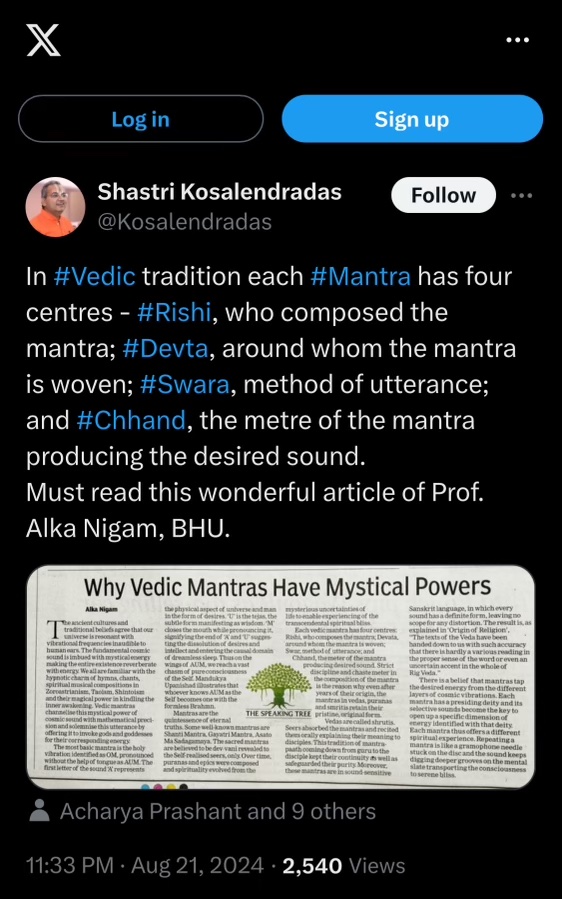Lullabies generally take drowsy children to a wishful land of magic- a stuff from which they weave their own world and safe and snug in the arms of mothers go to sweet sleep leaving the real, harsh world behind. But lullaby by queen Madalsa awakens her sons from slumber and opens the world of shocking illusions. It is a lullaby par excellence. Our ancient learning is loaded with wisdom serving as algorithms for the physical, mental and spiritual aspects of human beings. This unique lullaby that appears in Markandey Purana is one precious pearl from the priceless treasure of Hindu thought. Puranas carry on the insights of Vedas in simplified version for the masses and clarify the crux of Vedanta with the help of stories and events from history and mythology.
The daughter of a sage, Madalsa is respected as a learned woman of India. It was her education that guided her sons to renounce the royal comforts to become ascetics. She married king Ritadhwaj and bore four sons. The first three were named by the king as Vikrant, Subhau, Shatrumardana. But every time he named his sons, Madalsa laughed ironically. Puzzled by this, king asked her to name her fourth son. Deliberately she chose Alarka meaning ‘mad dog’. Since the first three sons had left for forest to do penance, King pleaded that the fourth son takes the responsibility of the throne. Both of them blessed Alarka to be an illustrious king and warrior. In Markandeya Purana there is mention of a lullaby that mother Madalsa used to sing while rocking the cradle of her son. Madalsa Upadesh is a lyric of twelve quatrains. The first eight quatrains contain in nutshell the kernel of Vedantic thought, powerful enough to drag any awakened soul from mesmerizing delusion to the light of Ultimate reality. The last four stanzas in brief lay out a guideline for his son to be a righteous king . The centripetal point of this song for her son is obliquely implied for the entire mankind. It says that you are pure, spotless and enlightened one with no name, only sleeping hypnotized in this body. Any Identity is only a superimposition on this flesh. Like a garment it gets tattered with time and like a vehicle on the ground can never be identified with the owner of the vehicle. The owner is ever –free. It is so foolish to consider “I am body”. The various qualities our personality seems to possess are created by imagination, a work of your ego. It is a jugglery of the five elements which are the building blocks of entire physical reality. These five Mahabhutas are Prithvi, Jal, Agni, Pawan and Aakash. In Chandodgya Upanishad Rishi Uddalak presents the same truth to his son Shwetketu as an example to elaborate that the Pure Being is beyond the body that is composed of five elements. Our physical body experiences these elements in the senses in the form of Shabad (space), Sparsh (air), Rupa (fire), Ras (water), Gandh (earth). Our primary emotions—fear, anger, joy, pain and compassion are intrinsically and inextricably linked with the energy of these elements. The nature of our personality, therefore, is determined by the ratio in which these elements exist in the amalgam. For example, we show anger when the element of fire is more active. At the time the physical body perishes, these elements dissolve and are absorbed into their original form. Only consciousness is left and THAT enters into the Ultimate Reality. Rishi Uddalak tells his son “That is You” TAT TWAM ASI – sans form, sans identity, sans name. Mother Madalsa reiterates the same truth telling her son that this body is like a jacket given to you only for the fruitification of your karmas. You are neither a son to anybody nor a father, nobody is yours, you are nobody’s. Like in a kaleidoscope these references keep on changing in many births with the changing combinations of physical elements. Don’t get trapped in this ever-inviting world which is a delusion created by the magnetic energy of Maya for the continuation of this creation. Your spotless, Pure Being is ever free.
Our Vedic Vangmaya is a treasure trove of these many and various scintillating jewels in the form of stories of self realization. The personal experiences of our Mantradrishta Rishis serve as beacon to guide any seeker on spiritual journey. It is for us to get started.
ALKA NIGAM

What a beautiful lullaby and explained so aptly by Dr. Alka ji! The Ved are treasure trove of knowledge and philosophy. It is lamentable that most of the Indians do not bother to understand their essence.
Shailji sorry for this late reply . Thank you for visiting the website and leaving a valuable comment. Since you read it , it is obvious that you are interested in reading but i have an inkling that you write too . If yes I would like to read Please let us remain connected